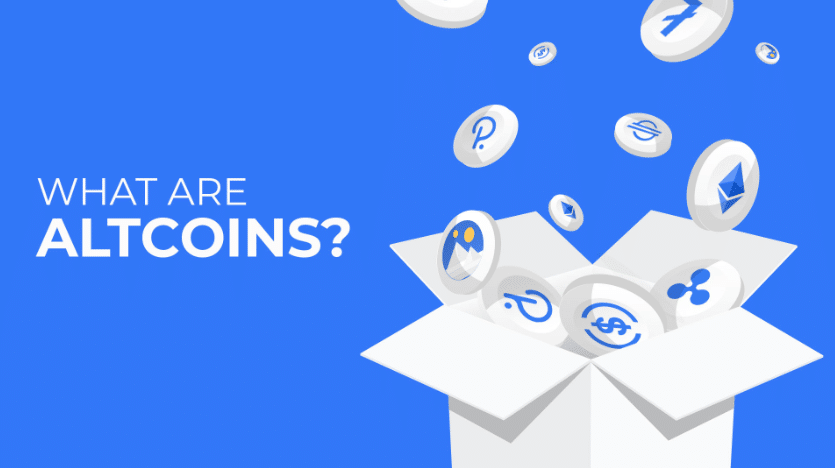As Bitcoin gains more mainstream recognition, people are starting to take notice of other cryptocurrencies as well. These digital coins that aren’t Bitcoin are called “altcoins.” Altcoins have been around for a while now, and there are thousands of them to choose from. In this article, we’ll explore the world of alternative cryptocurrencies, including what they are, how they differ from Bitcoin, and why you might want to invest in them.

1. What are Altcoins?
Altcoins are cryptocurrencies that are not Bitcoin. The term “altcoin” comes from “alternative coin.” They were created as alternatives to Bitcoin, but they differ in various ways, from the way they are mined to the features they offer. There are thousands of altcoins out there, each with its unique characteristics.
2. How Do Altcoins Differ from Bitcoin?
Altcoins differ from Bitcoin in several ways. Here are some of the most significant differences:
2.1 Altcoins Use Different Mining Algorithms
While Bitcoin uses the SHA-256 mining algorithm, many altcoins use different algorithms such as Scrypt, X11, or Ethash. These algorithms make it more difficult for ASIC miners to dominate the mining process, making it easier for people to mine altcoins with their home computers.
2.2 Altcoins Have Different Transaction Speeds
Bitcoin’s transaction speed can be slow, with transactions taking up to 10 minutes to confirm. In contrast, some altcoins have faster transaction speeds, with some processing transactions in seconds.
2.3 Altcoins Have Different Features
Altcoins often have different features than Bitcoin, such as smart contract capabilities, privacy features, and more. Ethereum, for example, is known for its smart contract capabilities, while Monero is known for its privacy features.
3. The Most Popular Altcoins
While there are thousands of altcoins out there, some are more popular than others. Here are three of the most popular altcoins:
3.1 Ethereum (ETH)
Ethereum is the second-largest cryptocurrency by market capitalization after Bitcoin. It’s known for its smart contract capabilities, which allow developers to create decentralized applications (dApps) on the Ethereum blockchain. Ethereum also has its cryptocurrency called Ether, which is used to pay for transactions on the Ethereum network.
3.2 Binance Coin (BNB)
Binance Coin is the cryptocurrency of the Binance exchange, one of the largest cryptocurrency exchanges in the world. Binance Coin is used to pay for trading fees on the Binance exchange, and users can get discounts on their fees by using Binance Coin.
3.3 Dogecoin (DOGE)
Dogecoin started as a joke but has since become one of the most popular altcoins. It’s based on the Shiba Inu dog meme and has a strong community of supporters. Elon Musk, the CEO of Tesla, has also tweeted about Dogecoin, causing its price to spike.
4. Why Invest in Altcoins?
There are several reasons why you might want to invest in altcoins:
4.1 Diversification
Investing in altcoins can help diversify your cryptocurrency portfolio. While Bitcoin is the most well-known cryptocurrency, it’s not the only one. Investing in altcoins can help you spread your risk across multiple cryptocurrencies.
4.2 Potential for High Returns
Some altcoins have seen significant gains in price, with some even outperforming Bitcoin. Investing in the right altcoin at the right time can result in substantial gains.
4.3 Early Adoption
Investing in altcoins can also give you exposure to emerging technologies and projects. Some altcoins represent the early stages of innovative projects that could change the world in the future.
5. Risks of Investing in Altcoins
While there are potential benefits to investing in altcoins, there are also risks to consider:
5.1 Volatility
Altcoins are often more volatile than Bitcoin, with their prices fluctuating rapidly. This volatility can make investing in altcoins riskier than investing in Bitcoin.
5.2 Limited Use Cases
Many altcoins have limited use cases, which can make them less valuable in the long run. If an altcoin doesn’t have a clear use case or value proposition, its price could eventually drop.
5.3 Scams
There are also risks of scams in the altcoin market. Some altcoins are created solely for the purpose of scamming investors, and it can be challenging to separate legitimate altcoins from scams.
6. How to Invest in Altcoins
If you’re interested in investing in altcoins, here are the basic steps to follow:
6.1 Choose an Exchange
Choose a cryptocurrency exchange that supports the altcoin you want to buy. Some popular exchanges include Binance, Coinbase, and Kraken.
6.2 Create an Account
Create an account on the exchange and complete any necessary verification steps.
6.3 Fund Your Account
Deposit funds into your account using a bank transfer, credit card, or other payment method.
6.4 Place an Order
Place an order to buy the altcoin you’re interested in. Make sure to consider the price and any fees associated with the transaction.
7. Conclusion
Altcoins offer a world of possibilities for investors looking to diversify their cryptocurrency portfolios. They offer unique features, use cases, and potential for high returns. However, investing in altcoins also comes with risks, including volatility and scams. Before investing in altcoins, it’s essential to do your research and understand the risks involved.
8. FAQs
1. What is an altcoin?
An altcoin is any cryptocurrency that is not Bitcoin. The term “altcoin” stands for “alternative coin,” and it refers to any cryptocurrency other than Bitcoin.
2. How do altcoins differ from Bitcoin?
Altcoins differ from Bitcoin in several ways, including their underlying technology, use cases, and market capitalization. While Bitcoin is the most well-known cryptocurrency, altcoins offer unique features and use cases that make them attractive to investors.
3. What are some popular altcoins?
There are many altcoins available, each with its own unique features and value propositions. Some popular altcoins include Ethereum, Ripple, Litecoin, and Dogecoin.
4. Why invest in altcoins?
Investing in altcoins can offer several benefits, including diversification, potential for high returns, and exposure to emerging technologies and projects.
5. What are the risks of investing in altcoins?
Investing in altcoins also comes with risks, including volatility, limited use cases, and scams.